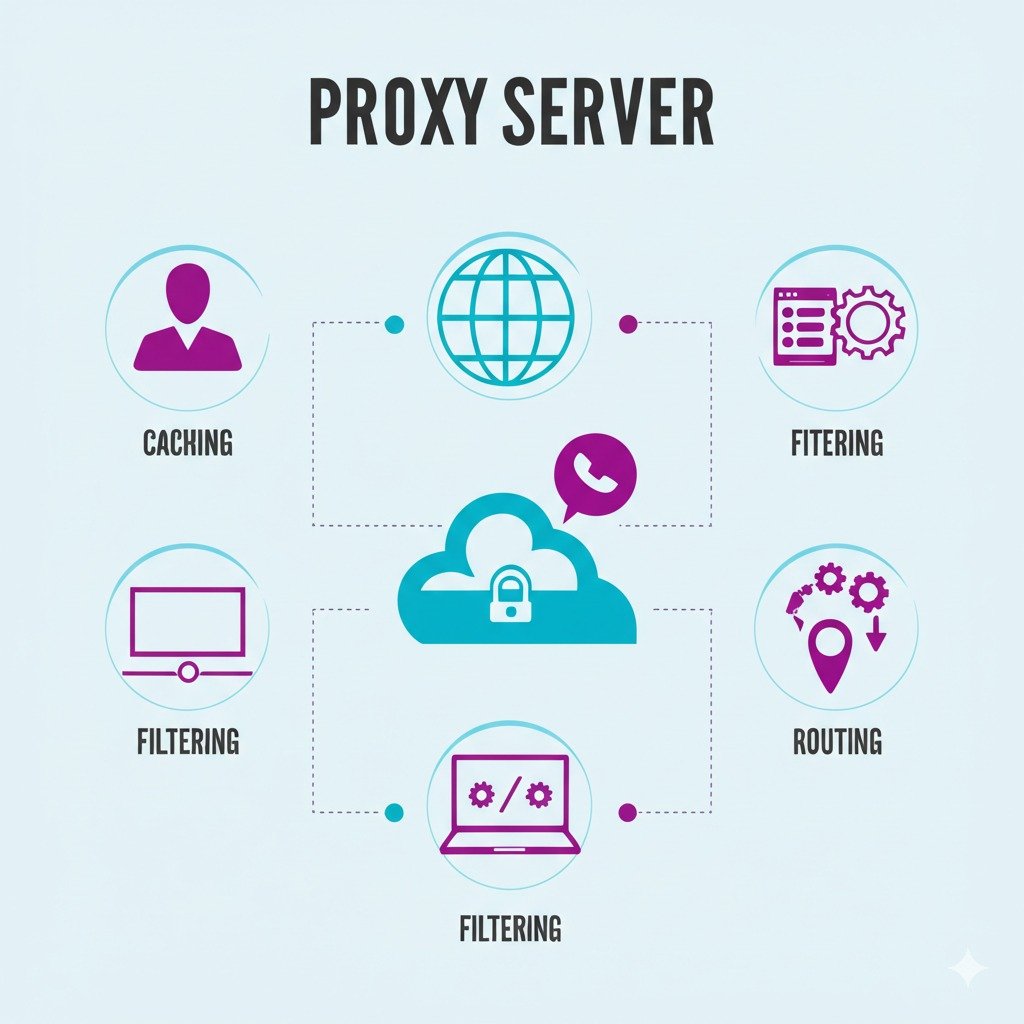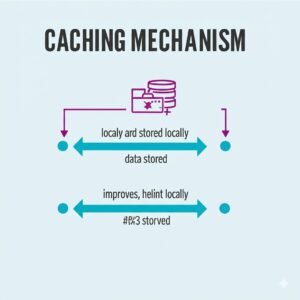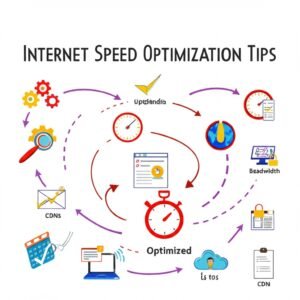We’ve all been there: browsing the internet, scrolling through our feeds, or watching a video when suddenly—buffering—and the internet speed seems to slow down to a crawl. It’s frustrating, right? In these moments, we might start searching for ways to speed up our connection. One common suggestion that pops up is using a proxy server. But does a proxy server increase internet speed, or is it just another myth?
The answer is a bit more nuanced than a simple yes or no. In my experience, using a proxy can sometimes help with speed, but it’s not a one-size-fits-all solution. Depending on the proxy type, how it’s set up, and where it’s located, a proxy server could improve or reduce your internet speed. Let’s dive into this and figure out what happens when you use a proxy.
Key Points:
- Proxy servers can speed up your internet by caching content.
- Location and quality of the proxy matter—distance and server load impact speed.
- Not all proxies are equal—free proxies may slow you down.
What Is a Proxy Server and How Does It Work?
A proxy server is essentially a middleman between your device and the internet. When you make a request to visit a website, instead of going directly to the website, your request goes through the proxy server first. The proxy then forwards the request to the website and sends the response back to you. This setup can provide a range of benefits, from improved privacy to better speed, but it really depends on the circumstances.
Proxies can cache frequently requested content, such as web pages, images, and files. When you visit a site multiple times, the proxy can serve the cached version of that content instead of re-downloading it from scratch, which saves time and bandwidth. This is where proxies have the potential to improve internet speed, especially for sites you visit often.
But just like a good coffee shop, the quality of the proxy matters. Not all proxies are created equal, and using the wrong proxy—like a free one—can lead to slow speeds due to heavy traffic or poor server infrastructure.
Can a Proxy Server Increase Internet Speed?
This is where it gets interesting. The short answer is: it depends. A proxy can speed up your internet in certain scenarios, but it won’t work miracles.
Here’s how proxies can help:
- Caching: Proxies can store content from websites you visit often. This can significantly reduce load times when you visit those sites again because the proxy doesn’t need to fetch the same data from the internet. It’s like having your favorite songs pre-loaded on your playlist, ready to play immediately.
- Traffic Optimization: In some cases, proxies can help manage internet traffic. For example, in a business environment with multiple users, proxies can help distribute traffic and reduce congestion. This makes browsing smoother for everyone.
- Reduced Bandwidth Usage: By compressing data and blocking unwanted ads or trackers, proxies can save bandwidth, which can ultimately lead to faster browsing, especially on slower connections.
However, don’t expect lightning-fast speeds from every proxy. The type of proxy server you use plays a huge role in determining whether your speed will improve. Let’s break down a few factors that affect speed.
How Proxy Servers Can Slow Down Internet Speed
While proxies have potential benefits, they also have downsides. In fact, I’ve experienced some slowdowns when using proxies, especially free ones.
Here’s why:
- Increased Latency: If the proxy server is far away from your location, it can increase the latency (the time it takes for your data to travel). This means your connection might feel slower because your request has to travel farther. Think of it like sending a letter across the world instead of just down the street. The farther the distance, the longer it takes.
- Server Load: If the proxy server is overloaded with requests from other users, your connection can slow down. Free proxies are notorious for this, as many users share the same servers. It’s like waiting in line at a fast food restaurant during peak hours—service is slower, and you get frustrated.
- Encryption Overhead: Some proxies, like those used for security, encrypt your data. While this is great for privacy, it can slow things down because your data has to be scrambled and unscrambled. It’s like trying to drive through a traffic jam while everyone else is going faster on the open road.
Factors Affecting the Speed of Proxy Servers
Several factors determine whether a proxy will help or hurt your internet speed. Let’s look at them in more detail.
Server Location
If you’re using a proxy that’s geographically distant from you, it will add extra time for your data to travel back and forth. I once tried using a proxy based in Europe while I was in the US, and the delay was noticeable. The closer the proxy is to your physical location, the faster it will be.
Quality of the Proxy Service
Not all proxies are made equal. High-quality, paid proxies typically offer better infrastructure, meaning they’re faster and more reliable. On the other hand, free proxies often have limited resources, which can lead to slower speeds. It’s like choosing between a sports car and an old, beat-up sedan—one is built for speed, while the other might struggle to keep up.
Bandwidth and Network Congestion
A proxy can help reduce congestion by distributing traffic across different servers, but if the proxy itself is overloaded, it will have the opposite effect. Network congestion can happen if too many users are accessing the proxy at once. This is why dedicated proxies are often faster than shared ones.
Proxy Configuration
How the proxy is set up matters too. A poorly configured proxy can actually slow things down, especially if it’s not optimized for speed. It’s like trying to drive with your brakes on—everything slows down unnecessarily.
Proxy Servers vs VPNs: Which One Is Faster?
Now, you might be wondering how VPNs compare to proxies in terms of speed. Both services can help with privacy and security, but when it comes to speed, there’s a clear difference.
- Proxies are typically faster than VPNs because they don’t encrypt your data (in most cases). This means less processing time and a faster connection.
- VPNs, on the other hand, offer better security by encrypting all of your data, which can slow things down. However, if privacy is more important to you than speed, a VPN might be the way to go.
In my experience, if speed is your main priority, a proxy is often the better choice, especially if you just want to bypass geo-restrictions or cache content. But if you need strong security along with speed, a VPN is probably a better option.
How to Optimize Proxy Usage for Better Internet Speed
If you’re set on using a proxy to increase your internet speed, here are a few tips to optimize the experience:
- Choose a High-Quality Proxy: Invest in a paid proxy service with good reviews. This will ensure better infrastructure and faster speeds.
- Pick the Right Proxy Location: Choose a proxy server that’s close to you geographically to minimize latency.
- Configure Your Proxy Correctly: Make sure your proxy settings are optimized for speed. If you’re unsure, check the provider’s guidelines or ask for support.
- Monitor Performance Regularly: Speed can fluctuate over time, so it’s important to keep an eye on your connection and switch proxies if needed.
FAQ
- Does using a proxy increase Internet speed? It can, but not always. Proxies can speed up Internet access through caching and data compression, but the actual impact depends on the quality and setup of the proxy.
- How does a proxy improve internet speed? A proxy improves speed by caching frequently accessed content and reducing the time it takes to load repeated requests.
- Can a proxy make browsing faster? Yes, proxies can make browsing faster, especially when accessing websites you visit often. The content gets cached, so it loads quickly.
- Do free proxies slow down internet speed? Yes, free proxies tend to be slower due to heavy server load and poor infrastructure.
- Are paid proxies faster than free ones? Generally, yes. Paid proxies offer better infrastructure, fewer users, and optimized performance, resulting in faster speeds.
- Can proxy servers reduce latency? Proxy servers can reduce latency if they are well-configured and located closer to your physical location.
- Does a VPN offer faster speeds than a proxy? In most cases, no. VPNs offer more security, but they tend to slow down your connection due to encryption. Proxies are usually faster.
Learn how proxy servers can boost your internet speed through caching and optimization. Find out if a proxy is the right solution for faster browsing.

i want to write a author box bio, my site based on ppmcalculator.com. provide me a short Biographical Info
2/2




